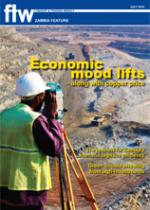Insuring cargo in Zambia could be
a risky business, warns Vincent
Witt, managing director of
Aon Zambia, a subsidiary of Aon
Corporation, the only global risk
consultant and insurance broker
operating in the country.
Liberalised in 1992, a market
that up to that time consisted of a
single state-owned insurer now has
nine Zambian insurance companies
offering cargo insurance.
The relatively small size of the
market and low statutory paid up
share capital requirements means that
“many insurers are under-capitalised
and this has therefore inhibited the
market’s ability to retain meaningful
levels of risk,”
he says.
And the risks are real. “We have
seen significant insurance claims
involving the theft of copper
concentrate and copper cathodes,
cobalt, anode slimes, and foodstuffs,”
he told FTW.
Due to the poor state of many
roads in the country, there are
also regular claims for machinery
damaged in transit.
“Purchasers of covers from local
Zambian insurers must be very
careful. Investigate the credit rating
of the insurer, and find out how
willing they are to pay claims,”
he advises.
Great care must also be taken to
read the fine print.
“Local policy wordings often
include a plethora of warranties
– many of which are impractical
or virtually impossible to comply
with, as well as a large number of
exclusions which limit the efficacy of
the cover,” he says.
“Furthermore, liability covers such
as professional indemnity for freight
forwarders, bailee’s/warehouseman’s
liability and the like are difficult to
obtain and tend to be limited in scope
and very expensive.”
Witt advises operators to seek
specialist liability covers in other
markets, provided that Zambian
insurance legislation is strictly
complied with in the process.
Owners of freight cannot assume
that the haulier or the warehouse
operator have sufficient insurance
in place.
“When dealing with service
providers and third parties, such
as hauliers, ensure that they have
adequate liability limits as Zambia is
becoming a more litigious country.
Frequently local service providers
have inadequate liability cover,”
he warns.
When there is a loss, expect to
wait. “There is a shortage of locally
registered loss adjusters in Zambia,
which means that delays in loss
assessments and therefore claims
settlements can be expected,”
he says.
One of the ways to manage
both risk and cost is to structure
the import and export agreements
so as to allow access to external
insurance markets, but at all times
local insurance legislation must be
complied with.
“A considerable number of imports
and exports are on a Cost, Insurance
and Freight (CIF), or Free on Truck
(FOT) / mine gate basis respectively,
thereby accessing external insurance
markets. This is driven by lower
external market insurance rates,
quicker claims settlements and
enhanced security,” he added.
‘Tread carefully when purchasing cover from local insurers’
13 Aug 2010 - by Ed Richardson
0 Comments
Zambia 2010

13 Aug 2010
13 Aug 2010
13 Aug 2010
13 Aug 2010
13 Aug 2010
13 Aug 2010
13 Aug 2010
13 Aug 2010
13 Aug 2010
13 Aug 2010
Border Beat
Featured Jobs
New
